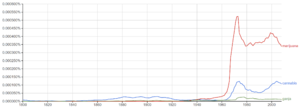Http://wiki.ubc.ca/Course:COGS200/2017W1/NGramAssignment/Group33/Lukas
Compare words
Compare several synonyms (words with nearly identical meanings, such as feline and cat). (a) https://books.google.com/ngrams/graph?content=pants%2C+trousers&year_start=1800&year_end=2000&corpus=15&smoothing=3&share=&direct_url=t1%3B%2Cpants%3B%2Cc0%3B.t1%3B%2Ctrousers%3B%2Cc0
(b) cannabis,marijuana,ganja (c) There is a peak (d)
Wildcard search
Google ngram allows you to search for * in place of a word. This allows us to look for a phrase. Try for example: favorite color is * This shows us that in English written text people’s favorite color is most often blue. (a) (b) Code = favorite sport is *. This code shows that peoples favorite sport has fluctuated greatly over the past two-three hundred years. Take golf for example. In the 1940's, golf wasn't a very popular sport, while in the late 1950's, golf was by far the most popular sport. Fast forward to 1980, and golf is once again one of the least popular sports. This shows the popularity of golf golf's evolution. Hunting is a another good example. While it was very popular in the 1920's and 1940's, it is not popular at all relative to other sports in modern times. (c)I am not sure what could be driving the effect based on the graph (d) There could be many explanations for differing sports preferences through the years. For example, hunting was once one of the most popular sports from 1920’s to the 1950’s. But in the 1960’s, it dropped dramatically. This could be due to commercial food production, ethical considerations of hunting for sport, and much more.
Inflection search
Pick a phrase and use the _INF on a noun and on a verb. Look to see which inflection is most frequent. Describe the effect. It may be the case that you can identify a reason for the effect, but just describing the effect in words is sufficient. (a) (b) do_INF it yourself (c) (d)
Search for a word using Part-of-Speech tags
Parts-of-speech tags can be used both to disambiguate homographic words that differ in part of speech, for example catch_NOUN, catch_VERB. It is also possible to see all parts of speech associated with a form: catch_* (a) (b) google_NOUN,google_VERB or (c) (d)
Search for Parts of Speech (not a specific word)
Use *_NOUN, *_VERB, etc. (a) (b) *_NOUN (c) (d)
